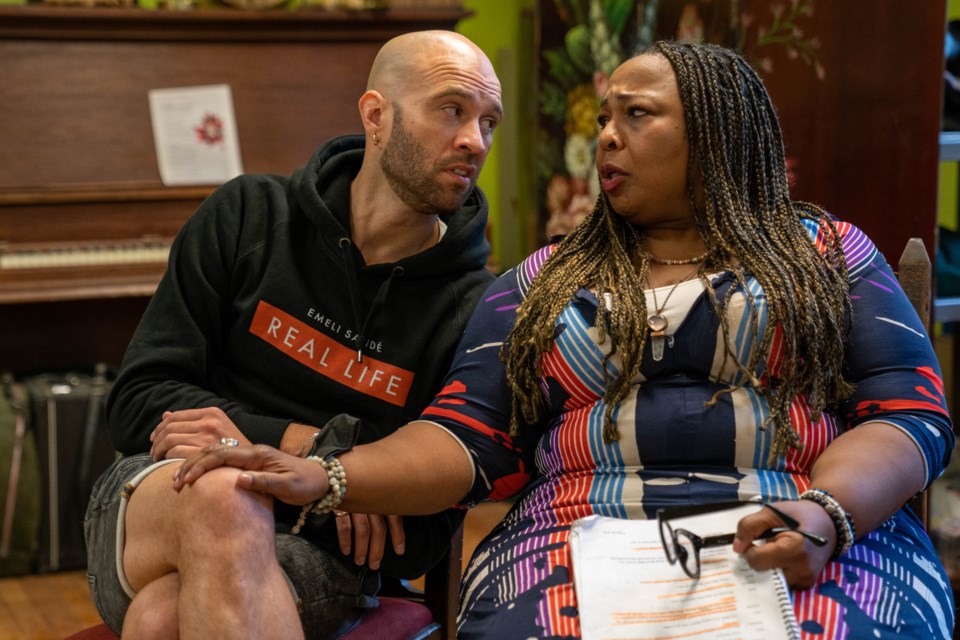The artistic team behind a Here For Now Theatre Festival production is aiming to create a more inclusive space for the Black-identifying community to engage with theatre by hosting a Blackout Night.
The Blackout Night performance of 'Every Day She Rose' will take place on August 9 at 8 p.m., welcoming an exclusively Black-identifying audience and offering tickets at a pay-what-you-can model.
Spearheading the special Blackout Night is the play’s associate director Tiffany Deriveau, who said the goal is to celebrate Black stories, artists and audience members by providing a safer space for them to experience theatre.
“Doing this piece now, and particularly doing the Blackout Night, is our contribution to where we want to see the future of theatre go,” she said. “We want to make the theatre a space not just for these stories, but to include broader scopes of audiences and make them feel welcome and seen.”
Deriveau emphasized the Blackout night is not meant to exclude anyone, but to offer a different way to approach heavy topics explored in the play for the Black community.
“It’s important to acknowledge that some people haven’t felt safe specifically in the theatre space, and it’s just one way of trying to create change in a positive direction,” she said. “Sometimes if you are in an environment where this topic can invoke feelings of guilt or anger, you might not feel as comfortable to interpret the piece in a way that you would if you were surrounded by your own community or other marginalized members.”
'Every Day She Rose' runs from Aug. 2 to Aug. 14 at the Falstaff Family Centre, as part of the Here For Now Theatre Festival. Tickets for all other performances – which are open to all community members and audiences – are $30.
The Stratford production stars Jenni Burke and Robbie Towns, with direction by Monique Lund.
The play, written by Andrea Scott and Nick Green, follows two friends who realize their racial and queer politics aren’t as aligned as they thought in the fallout of the Black Lives Matter protest at the 2016 Toronto Pride Parade.
Cathy Ann, a straight Black woman, and her roommate Mark, a gay white man, came home from the parade with differing views of what happened and how it affected their own communities. Throughout the show, playwrights Andrea and Nick pause to figure out how to work together to tell the story of a significant turning point in a friendship.
With the story unfolding through both sets of dialogue, 'Every Day She Rose' examines themes of white supremacy, police violence, privilege, and patriarchy in supposed safe spaces.
“The play explores racism, homophobia, sexism, privilege, politics, and friendship is the heart,” said Towns. “This show has searing wit, it’s really hilarious, but it is also about big issues. We are not hiding from those, but the way we ride those big issue waves is through joy and comedy and love.”
“It’s unflinching, this play. Nothing gets shied away from,” Lund said. “The themes are serious, but they’re told with grace.”
For Burke, who stars as Cathy-Ann, the play – which was written in 2019 – has taken on new meaning since the 2020 Black Lives Matter protests during the pandemic.
“From my perspective, the Black Lives Matter Movement was an awakening for me too,” she said. “In this play, it brings me back to the feelings, questions and thoughts that arose during the protests. What does being Black mean to me and my community? How can we support each other through the systemic trauma that we walk through life with all the time?”
The concept of Blackout nights in theatre began in New York City in 2019 with a production of 'Slave Play'. More recently, several theatre companies in Toronto have also hosted Blackout nights.
The Blackout Night performance of 'Every Day She Rose' in Stratford is believed to be one of the first of its kind in Perth County.
“Stratford is a growing and changing community. There’s still this attitude that people who are immigrants or racialized or minority groups, they’re visitors, they’re here to see theatre, or participate in theatre, but they’re not actual members of this community, which is not the truth,” Deriveau explained.
“We made it our mission to seek them out. These people are part of the fabric of this community, they are vibrant members of the community.”
She continued: “as a theatre community, we need to recognize they are here. We can’t keep creating content that caters to one demographic.”
By operating the Blackout night under a pay-what-you-can model, Deriveau hopes to make the production more accessible for a broader audience.
“Art is for everybody,” she said. “Economics is another point we need to overcome if we want to inspire people with our stories or inspire young people to become artist and tell their own stories.”
Burke added it’s also essential for the Black community to see themselves, and their authentic stories, represented in theatre to act as a springboard for further creative exploration and spark meaningful, progressive change.
“Representation matters,” Burke said. “As an artist, going to see a show where I can see myself up there, or see someone who looks like me or Robbie, it somehow gives me a signal that I’m a part of this, that I matter, and that this could be me too.”
Tickets to both the Blackout Night and all other performances are available at www.herefornowtheatre.com.



